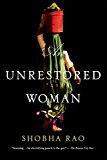Summary | Excerpt | Reading Guide | Reviews | Beyond the Book | Readalikes | Genres & Themes | Author Bio

* * *
By the time the puja was conducted and Neela's hair lay in a pile, coiled like seething black serpents on the dirt floor of the hut, it was early evening. The leaves hung dusty and exhausted on the banyan tree. The sun hissed and spit as it neared the horizon. Neela was watching it from the doorway when her mother-in-law ushered her inside. A pair of Babu's pants, hung from a nail beside the door, brushed against her newly shorn scalp and made it tingle. Neela thought of an army of ants scampering across her head and smiled.
Her mother-in-law looked at her. Her hand trembled as it reached for Neela's. How different they were: Neela's moist and smooth, her mother-in-law's tough and wrinkled like dried dates. She was crying again. "We'll drink this tonight," she said, slipping a thick bottle into Neela's hand. The bottle was made of dark brown glass—the color of a piece of chocolate she'd once eaten as a child, given to her by a wealthy uncle who was a clerk in a dry goods shop—and filled with liquid. "What is it?" Neela asked.
"Something to make us sleep," her mother-in-law said.
And Neela understood. Her father-in-law had died years ago, she'd never even met him, and now Babu was dead. What good were two women, two widows, alone in this world?
"Lalla said it would be quiet, peaceful, like falling asleep in a mother's arms," she said. Neela bent her head and wondered what that might feel like, to fall asleep in a mother's arms.
* * *
Neela woke the second morning after her husband's death with a pounding headache. She was groggy; her muscles ached. She was confused. Her mother-in-law had drunk half the bottle then handed it to Neela. She'd sipped it, not more than a drop or two, and held it in her mouth. Neela had waited till the old woman had closed her eyes then run to the back of the hut and vomited. She'd then slipped into the kitchen and buried the bottle in the bag of rice. Now, in the grim morning light, she turned to look at her mother-in-law. Her chest was still. Neela reached for her then snapped her hand away. Her mother-in-law's body was cold. Her eyes were open and lifeless, staring in the direction of the banyan tree.
Lalla came by later in the morning. He did nothing to hide his disgust. "You fool," he scowled. "You think that bottle was cheap? You spit it out, didn't you?" He eyed her with a cold stare. Neela wrapped her palloo tighter around her shoulders. "No," she said, "I didn't spit it out." Her face grew warm. What if he asked to see the bottle?
"Give me your mangal sutra," he finally said. "I'll see what I can do." Neela went to the bag of rice and dug her fingers into the kernels. How pleasant: the cool of the rice. Her hand first grazed the solidness of the bottle. She kept her expression unchanged; Lalla was watching her. She wriggled past it until she found the necklace. When her hands came up they were coated in a thin dust as if hundreds of butterfly wings had brushed against them. She handed Lalla the necklace. He returned an hour later and told her he'd secured passage for her on a bus headed for a nearby camp. It was set up by the Indian government, he said.
"For what?" she asked.
"For items that are useless," he said. "Like you."
* * *
When the bus pulled into the camp, some four hours after it'd set off from Attari, Neela noticed the small handwritten sign posted on the gate: CAMP FOR REFUGEES AND UNRESTORED WOMEN. District 15, East Punjab. Beyond was a row of tents. She was assigned to a small, dirty cot in the largest of the tents. Neela set down her bag, containing only her mother-in-law's white sari so that she'd have a change of clothes, and a pair of socks and chappals for when it got too cold to go barefoot. She looked around the enclosure. It was filled with women, all wearing white and all of them bald. It was funny, the rows and rows of shiny heads, and Neela smiled despite knowing that all of them, including herself, were supposed to be in mourning.
Excerpted from An Unrestored Woman by Shobha Rao. Copyright © 2016 by Shobha Rao. Excerpted by permission of Flatiron Books. All rights reserved. No part of this excerpt may be reproduced or reprinted without permission in writing from the publisher.
When you are growing up there are two institutional places that affect you most powerfully: the church, which ...
Click Here to find out who said this, as well as discovering other famous literary quotes!
Your guide toexceptional books
BookBrowse seeks out and recommends the best in contemporary fiction and nonfiction—books that not only engage and entertain but also deepen our understanding of ourselves and the world around us.